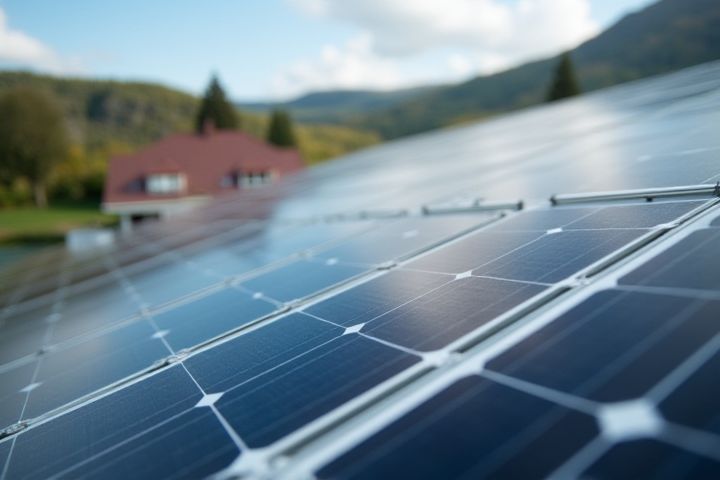
Investing in house solar panels significantly lowers your electricity bills by harnessing renewable energy from the sun. This clean energy source not only reduces your carbon footprint but also contributes to a sustainable environment. Solar panel installation can increase your home's value, making it a wise long-term investment. Many states offer tax incentives and rebates that can greatly offset the initial cost of solar installation. Over time, the savings from reduced energy costs can result in a substantial return on investment for homeowners.
Why Invest In House Solar Panels
Reduced electricity costs
Investing in house solar panels can lead to significant reduced electricity costs, as homeowners can generate their own renewable energy. By installing a solar panel system, you can potentially reduce your monthly electricity bill by up to 50% or more, depending on your energy usage and local sunlight availability. In some cases, excess energy produced can be sold back to the grid, providing additional savings or income through net metering programs. Over time, these savings can offset the initial installation costs, making solar panels a financially savvy investment for long-term energy independence.
Environmental benefits
Investing in house solar panels significantly reduces your carbon footprint, with each kilowatt-hour of solar electricity generated offsetting approximately 0.4 kilograms of CO2 emissions. By utilizing renewable energy, households contribute to a substantial decrease in air pollution, improving local air quality and respiratory health. Solar panels harness sunlight, a sustainable energy source that minimizes dependence on fossil fuels, which account for nearly 75% of global greenhouse gas emissions. Switching to solar energy not only supports environmental conservation but also helps combat climate change, promoting a healthier planet for future generations.
Financial incentives and rebates
Investing in house solar panels can significantly reduce your electricity bills, often decreasing them by 50% to 70%. Many states offer attractive financial incentives, such as solar tax credits, which can cover up to 26% of installation costs. Additionally, local utility companies often provide rebates that can further lower your initial investment by several thousand dollars. With these financial incentives and the potential for increased property value, transitioning to solar energy can offer a strong return on investment for homeowners.
Increased home value
Investing in house solar panels significantly increases your property value, making it a smart financial decision. Homes equipped with solar energy systems often sell for more than comparable homes without them, providing an attractive return on investment. Potential buyers are increasingly drawn to energy-efficient features that promise lower utility bills and sustainability. Furthermore, solar panels may qualify your home for various incentives and tax credits, further enhancing its market appeal and value.
Energy independence
Investing in house solar panels enhances energy independence by significantly reducing reliance on traditional power grids. With the average U.S. home consuming about 877 kWh per month, solar panels can generate substantial electricity, potentially covering all or most of your energy needs. This transition not only protects against fluctuating energy prices but also decreases greenhouse gas emissions, contributing to a sustainable future. By harnessing solar energy, you can achieve greater control over your energy sources and costs, securing a more stable financial outlook.
Low maintenance requirements
House solar panels require minimal maintenance, making them a practical investment for homeowners. With an average lifespan of 25-30 years, these systems typically only need a thorough cleaning once or twice a year to ensure efficiency. Routine inspections can catch potential issues early, often reducing the need for costly repairs. By minimizing upkeep, you can focus your time and resources on enjoying the savings from your renewable energy source.
Long lifespan
House solar panels typically have a lifespan of 25 to 30 years, making them a long-term investment for homeowners seeking sustainable energy solutions. With minimal maintenance required, these panels can significantly reduce your electricity bills over time, often providing a return on investment within 5 to 10 years. The durability of modern solar technology often comes with warranties ranging from 20 to 25 years, ensuring your investment is protected against defects and performance issues. By generating clean energy, you not only contribute to environmental sustainability but also increase your property value, enhancing your overall investment portfolio.
Technological advancements
Investing in house solar panels is increasingly attractive due to significant technological advancements that have reduced costs and improved efficiency. Recent innovations in photovoltaic cell technology have led to panels exceeding 22% efficiency rates, allowing you to generate more electricity from the same roof space. Furthermore, developments in energy storage solutions, such as lithium-ion batteries, enable homeowners to store excess energy, enhancing energy independence and reducing reliance on the grid. With government incentives and tax credits available, the average return on investment for solar panel systems can reach 20% or more, making it a financially savvy choice.
Potential for energy storage
Investing in house solar panels significantly enhances your potential for energy storage, allowing you to harness the sun's energy for later use. With advancements in battery technology, homes can now store excess energy produced during sunny days, enabling homeowners to use this stored power even at night or during cloudy periods. Energy storage systems can reduce your reliance on the grid, often resulting in savings of up to 50% on utility bills. Moreover, integrating solar panels with energy storage solutions often leads to increased property value, making it a prudent financial decision alongside its environmental benefits.
Protection against rising energy prices
Investing in house solar panels provides a strategic safeguard against the escalating costs of energy, which have increased by an average of 15% annually over the past decade. By generating your own electricity, you can significantly reduce your reliance on utility companies, insulating yourself from unpredictable price hikes. Over a 25-year lifespan, solar panels can save homeowners tens of thousands of dollars, with potential savings reaching up to $50,000 or more depending on location and energy consumption. With the average cost of electricity projected to keep rising, installing solar panels is an effective measure for securing long-term financial stability.
